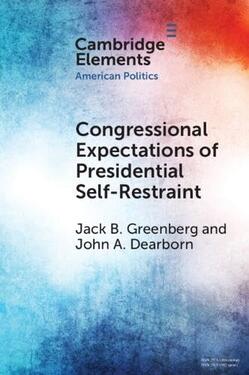Congressional Expectations of Self-Restraint

What happens when a U.S. president violates the law — or the norms that make them work?
Despite concerns raised by recent events, this question is not new to political scientists, legal scholars, and politicians. In fact, Congress has long written laws that rely on presidents to resist urges to thwart their expressed goals.
In an upcoming book, “Congressional Expectations of Presidential Self-Restraint,” political science Ph.D. candidate Jack Greenberg and John Dearborn, Yale Ph.D. ’19 and assistant professor of political science at Vanderbilt University, probe the contours of this norm in historical context. They examine laws involving the FBI director, the Office of Personnel Management director, the chairman of the Joint Chiefs of Staff, the director of national intelligence, the Federal Emergency Management Agency administrator, inspectors general, and more.
“This project is a testament to the connections fostered at the Institution for Social and Policy Studies and the strength of the faculty advising available here,” said Greenberg, who met Dearborn at ISPS under the mentorship of ISPS faculty fellow and Pelatiah Perit Professor of Political and Social Science Stephen Skowronek.
We recently spoke with Greenberg about reliance on presidential self-restraint and its consequences in this perilous moment for democracy.
ISPS: Your book explores how Congress has designed laws reliant on an assumption of presidential self-restraint. Could you explain what you mean by this?
Jack Greenberg: Certainly. We look at how Congress has historically expected presidents to respect statutory goals by declining to use their formal powers in ways that are legally permissible but contrary to congressional intent. This assumption of self-restraint is increasingly being challenged.
ISPS: How so? What factors are in play here?
JG: We take a developmental approach to this phenomenon and discuss three core factors: presidentialism, polarization, and constitutional formalism. Presidentialism involves a bipartisan impulse to use presidential power to achieve policy ends, even at the expense of structural constraints or norms. In essence, the presidency is seen as the national help desk — where we look to get problems solved.
ISPS: And that’s something Congress embraces?
JG: Yes. Members of Congress have often been eager to shift governing burdens onto the presidency. This dynamic is in part a function of members’ own electoral incentives, particularly with respect to foreign policy, as lawmakers have to focus attention on their own districts or states, including trying to bring dollars home to their constituents. Moreover, Congress is under-resourced in comparison to the executive branch, which just knows a lot more about what is going on in the country and the world. The average member of Congress has to focus on surviving, standing for reelection every two or six years. You have to be around a while before you can gain significant influence.
ISPS. OK. And by polarization, you are talking about a lack of bipartisan effort to constrain a president?
JG: Exactly. And polarization has increased over the last few decades, making it even more unlikely for co-partisans of the president to stand against him, for which there can be significant repercussions. As an example, all but two Republican House members who voted in favor of Trump’s second impeachment are now out of office. When you have a lot of partisan enmity, it’s hard to think about advancing a coalition across the aisle in service of reclaiming the legislature’s institutional power.

ISPS: And what’s constitutional formalism?
JG: Constitutional formalism is a strict conception of the Constitution’s separation of powers and what it allows for. Formalism often limits Congress’s ability to check the president. This orientation has developed over time, with courts increasingly intervening in the relationship between the executive and the legislature in ways that limit prospects for power sharing.
ISPS: Haven’t courts played a role in balancing power?
JG: Yes, but recent jurisprudence has made it harder for Congress to constrain the president, especially with respect to the president’s appointment power. A 1935 Supreme Court decision, Humphrey’s Executor, limited the president’s power to remove certain officials. Were it overturned — an ambition of the Trump administration — constraint would grow even more difficult.
ISPS: Has presidential power only increased since the years immediately after Watergate?
JG: There was a period post-Watergate where Congress reasserted its power, but significant power has subsequently shifted back, especially after 9/11. Particularly since Nixon, presidents have increasingly sought to centralize power, often with the support of their co-partisans in Congress. Consider President Obama. He campaigned on reducing presidential power, but when he wanted to conduct military operations against ISIS, he claimed authority to do so from the 2001 Authorization for the Use of Military Force enacted after 9/11. When presidents get into the role, they often feel immense expectations cast upon them and move to press every advantage they have.
ISPS: How much has Congress relied on norms rather than laws to restrain presidents?
JG: A lot. Many restraints on presidential power are based on norms rather than formal mechanisms. For example, the expectation that an FBI director serves a full 10-year term is a norm, not a legal requirement. Congress had an expectation that the same person would lead the FBI for a decade. They would serve across administrations and not as a member of any one president’s team. But there is no formal mechanism to make a president respect this expectation. The only pressure is that the Senate could make it difficult to confirm a replacement.
ISPS: You write about how these norms have been increasingly undermined in recent years. Trump famously fired FBI Director James Comey. And his replacement, Chris Wray, resigned before the inauguration under the reasonable expectation Trump would fire him upon returning to the White House. The president is now circumventing federal court orders. What can history teach us about the current constitutional crisis?
JG: History shows that when one branch becomes too powerful, another can take actions to restore balance. However, the current situation is challenging because Congress and the Supreme Court have shown limited willingness to check the executive branch.
ISPS: What happens when the congressional majority cedes their role in the separation of powers to their party’s president?
JG: It’s a tough situation. Beyond electoral pressure or institutional interest, there’s very little basis to compel a branch of government to do its job. We see trends where the prospects of self-restraint are diminishing, and Congress’s options in response are increasingly thin.
ISPS: If a president cannot be removed from office through impeachment (because of his party’s unwillingness to pay the political price for defying him) and the Supreme Court has granted functional criminal immunity for any action taken while in office, how can a rogue president be constrained?
JG: That is a tall order, especially since the Court held in Trump v. United States that presidents are immune from criminal prosecution for their “official acts.” One of the fundamental elements of the separation of powers system is that the president has a first-mover advantage. He gets to test the boundaries of what he can do, and everyone else has to play catch-up. By the time they catch up, he may already be on to other things.
ISPS: So where does that leave us?
JG: I think if there is going to be any pushback anywhere, it’s going to have to come from the citizenry. We need to have a much bigger conversation about what we want as a country from the American president. People like me who study this can talk about the challenges of democratic governance associated with a strong executive. Trump has brought these issues into greater relief, and that can increase public understanding. But power is a difficult thing to reclaim.
ISPS: How confident are you that future presidents might be bound by norms and self-restraint?
JG: I am rather skeptical. We are talking about more than Trump in our work. There is something about the institution of the presidency itself that often does not inspire moderation. The current trend suggests that norms are weakening, and without more substantive legal reforms, we may continue to see presidents pushing the boundaries of their power.